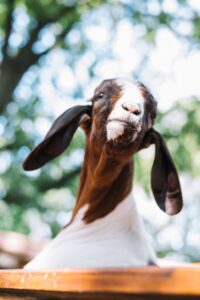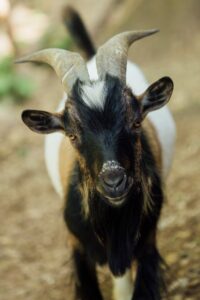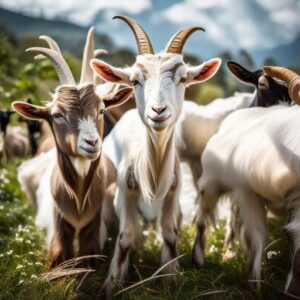Introduction
The Boer goat is a South African breed of meat goat that was selectively bred in the Eastern Cape from about 1920 for its meat qualities and ability to survive by grazing on the thorn veldt of that region. It is one of the most productive meat goat breeds in the world.
Characteristics of the Boer goat.
-
- Weight: Males weigh an average of 114 kg, while females weigh around 94 kg.
- Height: Both males and females have an average height of 78 cm.
- Coat Color: Boer goats commonly have white bodies and distinctive brown heads. Some Boer goats can be completely brown or white, or have large spots of a different color on their bodies.
- Traits: They are known for being docile, fast-growing, and having high fertility rates. Ewes are reported to have superior mothering skills compared to other breeds.
- Adaptability: Boer goats are well adapted to grazing on a wide variety of local biomes, including sourveld, coastal veld, mixed veld, and thornveld. They have a fast growth rate, good carcass qualities, resistance to disease, and adaptation to hot, dry semi-desert conditions.
How long do Boer goats live?
The Boer goat has a lifespan that can vary depending on various factors. On average, Boer goats live between 8 to 12 years. However, with proper care, they can live up to 20 years. It’s interesting to note that female Boer goats tend to live longer than males.
How do you take care of Boer goats?
Taking care of Boer goats involves several important aspects to ensure their health and well-being. Here are some key considerations:
- Regular Check-ups: Schedule regular check-ups with a veterinarian to monitor the health of your herd. Proper vaccinations, deworming, and hoof trimming.
- Proper Nutrition: Provide a balanced diet that meets the nutritional requirements of Boer goats. High-quality pasture feeding can help keep feed costs down.
- Adequate Shelter: Boer goats require a loafing shed or draft-free barn to protect them from weather conditions and predators.
- Fresh Water Supply: Ensure a clean and fresh water supply for your goats at all times.

Are Boer goats good for milk production?
Boer goats are primarily bred for their meat qualities, but they can also produce milk. The milk of Boer goats is known to be of high quality, with higher protein and fat content compared to other dairy goat breeds. However, it’s important to note that Boer goats are not typically selected for milk production as they are not considered to be good milk producers2. The actual milk production of Boer goat does under extensive management systems ranges from 1.5-2.5 kg/day, depending on the age of the doe and lactation number.
If you’re specifically looking for goats that are excellent milk producers, there are other breeds that are better suited for this purpose. Raising dairy goats requires special nutrition management, daily milking, and mandatory breeding to maintain milk production. These breeds are typically focused on milk production rather than meat qualities.
What are some other meat goat breeds?
Apart from the Boer goat, there are several other meat goat breeds that are known for their meat production qualities. Here are some examples:
- Kiko Goat: Originating from New Zealand, Kiko goats are known for their hardiness, fast growth, and excellent maternal instincts.
- Myotonic Goat (Fainting Goat): This breed is known for its unique characteristic of muscle stiffness or “fainting” when startled.
- Nubian Goat: Nubian goats are popular for their high milk production and adaptability to various climates.
- Rangeland Goat: These goats are well-suited for grazing on natural rangelands and have good resistance to parasites.
- Savanna Goat: Savanna goats are known for their adaptability to harsh environments and resistance to diseases.
- Texmaster Goat: Texmaster goats are a crossbreed between Boer and Spanish goats, combining the meat qualities of Boer goats with the hardiness of Spanish goats.
- Pygmy Goat: Although primarily kept as pets or for exhibition purposes, Pygmy goats can also be raised for meat production on a smaller scale.

Are dairy goats easy to raise?
Raising dairy goats requires careful attention and effort, but with proper planning and management, it can be a rewarding experience. Below are some key points to consider:

- Knowledge and Research: Educate yourself about the specific breed of dairy goat you plan to raise. Learn about their nutritional needs, health requirements, and general behavior.
- Housing and Space: Provide adequate shelter for your goats, ensuring protection from extreme weather conditions and predators. Goats need enough space to roam, graze, and exercise.
- Feeding and Nutrition: Dairy goats require a balanced diet that includes fresh water, good-quality hay or pasture, and a formulated grain ration. Consult with a veterinarian or local experts to determine the specific nutritional needs of your goats.
- Healthcare: Regularly monitor the health of your goats and establish a relationship with a veterinarian who specializes in goat care. Vaccinations, deworming, hoof trimming, and other preventive measures are essential for maintaining their well-being.
- Milking Routine: If you plan to milk your dairy goats, establish a consistent milking routine. This involves proper sanitation practices, regular milking intervals, and appropriate storage of milk.
- Breeding Management: If you intend to breed your dairy goats, learn about proper breeding techniques and ensure responsible breeding practices. This includes selecting suitable mates, monitoring pregnancy progress, and providing appropriate care during kidding.
- Time Commitment: Raising dairy goats requires time and dedication. Daily chores such as feeding, milking, cleaning pens, and monitoring health should be factored into your schedule.

